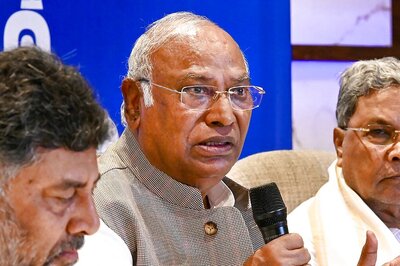
views
New Delhi: Twelve Indian Force Mirage-2000 jets crossed the Line of Control (LoC) early on Tuesday morning and destroyed terror camps of Pakistan-based Jaish-e-Mohammed in Balakot. The air strike, which has been dubbed "Surgical Strikes 2.0', comes two weeks after a terror attack on CRPF soldiers in Pulwama, Jammu and Kashmir.
Foreign secretary Vijay Gokhale on Tuesday while addressing the press also confirmed the air strike and said a large number of JeM terrorists, trainers and senior commanders were eliminated in largest JeM camp in Balakot. The camp was led by Maulana Yusuf Azhar alias Ustad Ghauri, the brother-in-law of JeM chief Masood Azhar.
The government said the camp was located on a hilltop, deep in a forest, and far away from any civilian presence.
Speaking to News18 in an interview, the former Vice Army Chief highlighted that if a country decides to take such a step, that India has, a retaliation is always something that one should be prepared for.
These are edited excerpts from the interview:
Do you think there is a retaliation possible? What happens in the event of the same?
India is prepared. The country has taken an action this deep into the heartland but was very focused on the terrorists that hurt us. Neither were there any civilian or military casualties nor were any defense establishments targetted.
If you go for such an action, as a country you are always ready for retaliation. India as a nation and its military have shown their focus and readiness for any eventuality.
What we have done is very legitimate and the last option. The possibility of a retaliation remains for which we will have to be prepared.
Are we in a state of war right now?
On the situation, Pakistan has been in a state of war, a proxy war through terrorism, a state driven policy, for a long time. India has done everything possible whether it be on a diplomatic front or on foreign policy level and when all that was unsuccessful, we needed to deal with terrorism ourselves.
In my view, it is not a state of war, as we have struck a target that actually is the source of terror that has been hurting us. Pakistan, on the other hand has been protecting them.
What were the challenges India must have faced for such a strike?
About the strike, India had two challenges, one, to penetrate the organization that emboldens it and second, to treat with the malady directly. It is for the first time that we have struck this deep into PoK and beyond, and this sends a very strong and important message.
Whenever we talk of LOC, boundaries, PoK, and parts of Pakistan, the perspective is clearly the line that everyone respects. In the current scenario, there is no line that Pakistan or the terrorists respect,
What are the risks involved in such an air strike?
The risks involved in such air strikes are significant when you do it. But then there is a risk in every military action, right from a tactical level to the execution level. But the risks are calculated. The risks at the strategic level are so well deliberated upon and discussed, factors of the existing environment are taken into consideration along with our capabilities to prosecute.
There was of course a possibility of casualties, but these considerations do not deter the mission. The mission would have been accomplished no matter what. Such strikes are deliberated and executed only after accurate inputs about the camps.
Why do you think Air Force was chosen for the strikes?
It was befitting the environment of the target, and the nature of strike required. The aim that was to be achieved this time probably could not be done by the ground forces and second, it was well within range of the Indian Air Force.
It is very important to remember that the situation at hand needs to be maximized. The surgical strike after Uri was done to send across a strong message to the adversary.
What was the difference between the Uri surgical strikes and this air strike?
This time, it was beyond a message as the terrorist organization is now together with the Pakistan military and are now being so well guarded by Pakistan through policy and strategies that it so fearlessly owns.
This was not just a message to the terrorist organisations but the country behind it as well.




















Comments
0 comment